Did you know that we produce 300 million tons of plastic worldwide every year? That is nearly the weight of the entire human population! It’s estimated that each year, 8 million tonnes of plastic end up in oceans – and single-use plastic makes up roughly 50% of this amount.
The big problem with plastic waste is that we just don’t know how long it will take to break down. Researchers believe that plastic may take up to 500 years to break down, but others think it may never fully break down – only break up into smaller pieces. Right now, these micro plastics can be found in our drinking water, in the fish we eat, and in the soil we grow our food in. Scientists think that we could be eating as much as a credit card sized amount of micro plastics each week!
Being plastic-free is all about reducing or eliminating plastic pollution – so that we can have cleaner streets, oceans, and communities.
What is Single-Use Plastic?
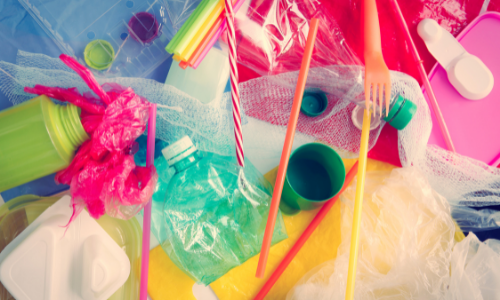
Plastics can be found everywhere in schools. From soft plastic packaging at lunchtime, to plastic rulers, pens, and other stationery, plastic can be found in the canteen, office, and classroom.
Single-use plastics are items that are made to be used once or maybe twice and then thrown away. These are items that we use every day, for as little as five or ten minutes at a time, and then discard. Items like bottles, straws, takeaway containers, and shopping bags, are everywhere. While cheap and convenient, single-use items are also doing immense environmental damage right under our noses.
Don’t worry – it’s not difficult to do our bit for the environment. Most of the time plastic items can be swapped out for reusable, recyclable, or biodegradable alternatives! It’s up to us to make a difference.
Is It Possible to Become a Plastic-Free School?

Plastics haven’t always been a commonplace item in schools as they are now. Believe it or not, there was once a time when all schools were plastic free! Nowadays, plastics can unfortunately be found everywhere. You may find it a challenge to completely eliminate plastic from your school. But if you put your mind to it and work together? It’s not a completely impossible task.
Want to help, but don’t know where to start? Here are 8 easy ways to reduce single-use plastics in your school. Working together, we can make all the difference!
1. Change up your school culture
The first step is to educate and inform your staff, students and parents. People don’t alter their behaviour if they don’t know better. Make sure that they are aware of why plastics are damaging to the earth, and what alternatives are available. You could hold a training day for staff and families, or an ongoing program. Some local councils run events or offer programs for businesses – have a look if there are any in your local area. Communication is key to changing your school culture. Once everyone is educated, you will be surprised at how much they will want to get involved.
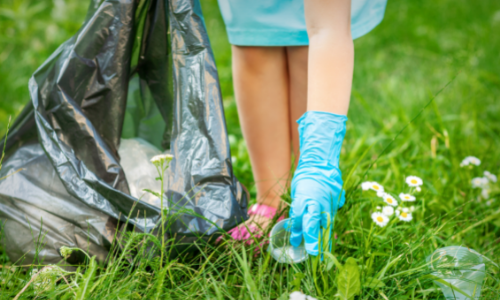
2. Hold a Clean-Up day
One of the best ways to educate your students and staff is to hold a Clean-Up Day! Grab some degradable trash bags and take the kids out picking up rubbish in the local parks, sidewalks, waterways, and bush land. Use this as a chance to educate and encourage staff and students and help them to feel that you are all working together. Kids love to get involved with projects like this, especially if there are incentives to keep them committed and coming up with creative new ways to help.
3. Do a ‘Green Audit’
You might not be aware of exactly how many of the items in your school are plastic, as well as what types of plastic are able to be recycled. Conduct a Green Audit and find out! Identify which school supplies (like pens, rulers, and highlighters) can be replaced with more eco-friendly solutions. Identify items that are single-use, like stationery packaging, cleaning products, food packaging, office supplies, cutlery and straws. Replace them with alternatives, and dispose of the rest thoughtfully (recycle)!
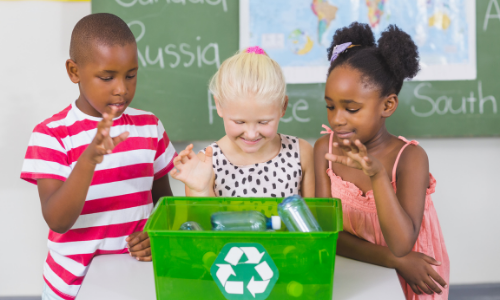
4. Implement a Plastic Ban
This might sound extreme, but it can be the most effective way to really make a difference! Many schools and offices ban items which cannot be reused, like water bottles, plastic straws, disposable lunch containers, and coffee cups. Ensure that people know what the alternatives are.
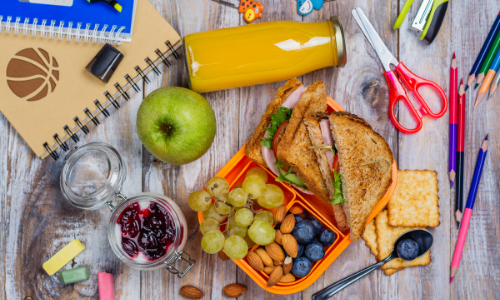
5. Reusable lunch options
Many people use the disposable plastic option because other options are not available. But the alternatives are actually not a very expensive investment. It is common for schools to provide school logo branded refillable water bottles. Some school canteens go a step further and serve lunch using reusable or biodegradable plates, cups, and cutlery. Schools should encourage parents to pack reusable lunch boxes for their children – cutting out disposable packaging while also saving parent’s money in the long-term.
6. Responsibly source your school supplies
Let’s be honest, unnecessary plastic is everywhere in schools, but it hasn’t always been that way! It’s important to look in places like; stationery, cleaning supplies, school office packaging, printer cartridges, even things like toys and balloons! It can be something as small as the plastic packaging on notebooks, plastic pens, markers, and rulers. Many companies offer greener alternatives for school stationery and eco-friendly solutions for your school’s office.

7. Recycling bins
We have all heard of Reduce, Reuse, Recycle. Of course, it would take a very dedicated person to completely avoid plastics – plastic is unfortunately a fact of modern life. That’s why it is so important to ‘Close the Loop’ and recycle any plastic that you use. Check out your local council program or look for an outside organisation. Many supply companies let you return used items back to the business for re-use and recycling. Implement or improve the waste-stream in your school by providing clearly labelled and colour-coded recycling bins, with clear instructions on what can be recycled and what can’t be.
Becoming a plastic-free school isn’t complicated. With these easy tips you can get your school involved in making a difference. Working together, we can all do our bit to help the environment!

